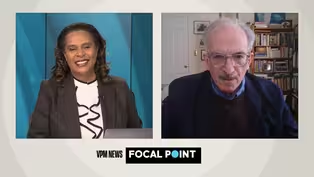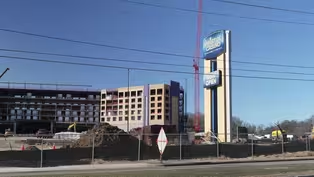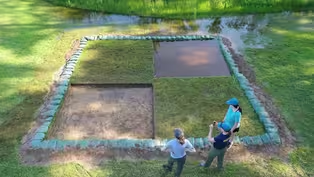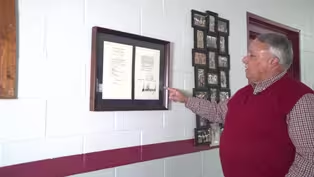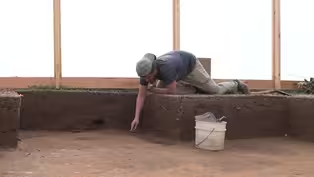VPM News Focal Point
Awakening Algonquian
Clip: Season 3 Episode 4 | 3m 21sVideo has Closed Captions
A group of women from native tribes in Virginia are working to revive Algonquian language.
In Virginia, a group of women are beginning efforts to bring back their ancestral language by weaving together the past and the present to restore their linguistic heritage.
Problems playing video? | Closed Captioning Feedback
Problems playing video? | Closed Captioning Feedback
VPM News Focal Point is a local public television program presented by VPM
The Estate of Mrs. Ann Lee Saunders Brown
VPM News Focal Point
Awakening Algonquian
Clip: Season 3 Episode 4 | 3m 21sVideo has Closed Captions
In Virginia, a group of women are beginning efforts to bring back their ancestral language by weaving together the past and the present to restore their linguistic heritage.
Problems playing video? | Closed Captioning Feedback
How to Watch VPM News Focal Point
VPM News Focal Point is available to stream on pbs.org and the free PBS App, available on iPhone, Apple TV, Android TV, Android smartphones, Amazon Fire TV, Amazon Fire Tablet, Roku, Samsung Smart TV, and Vizio.
Providing Support for PBS.org
Learn Moreabout PBS online sponsorshipKEYRIS MANZANARES: Indigenous peoples have deep ties to William & Mary's campus.
The land was originally claimed by native populations, and prior to 1723, Indian boys attended residential school at the college's Wren building, and later Brafferton.
Now, in a space where Indigenous peoples were stripped of their cultural heritage, including language, this group of women has chosen William & Mary as a meaningful place to meet, to awaken what was once lost.
RAVEN “BRIGHTWATER ” CUSTALOW: Unfortunately, through assimilation and the genocidal practices, both physical and paper genocide, our people in this area haven't spoken fluently in at least 200 years, I would say.
So all we have left are a few, maybe a thousand or so words, if that.
KEYRIS MANZANARES: Raven “Brightwater ” Custalow grew up on the Mattaponi tribe reservation in King William County.
She's committed to advocating for preserving Indigenous heritage.
RAVEN “BRIGHTWATER ” CUSTALOW: I think most of us can probably say a maybe short introduction.. wingapo (hello), (welcome) nitapewak (my friends), kenah (thank you) anah (goodbye), those sort of like basic words that you would use in like everyday language.
KEYRIS MANZANARES: During meetings, Custalow, along with Diana Gates and Young Brinson who are cousins from the Cheroenhaka Nottoway Indian Tribe research words and pronunciations as they start trying to put the puzzle of Virginia's Algonquian language back together.
YOUNG BRINSON: The culture of Virginia has always been steeped in Algonquian culture, and I think that's why we've been led to it.
And so it's just cool that we are all coming together now to really lift this off the ground and get it started because we're making moves and I love it.
KEYRIS MANZANARES: The group is in the beginning stages of language revitalization.
And while they may never be fluent, they hope future generations will be.
DIANA GATES: Native children who are surrounded and enveloped in the warmth of their community and their culture, they're connected to their tribe.
Through speaking their language, the rates for substance abuse, suicide, they go drastically down, high school graduation rates go drastically up.
KEYRIS MANZANARES: Because Virginia tribes were colonized much earlier than those out West, Gates says reviving their language can feel isolating.
DIANA GATES: We were colonized in the early 1600s.
We had a boarding school called the Brafferton, which is located here at William & Mary, and it's all of these sort of historical elements of stripping away, piece by piece, culture and language that it's really healing for us to say, well, these parts of us aren't dead.
RAVEN “BRIGHTWATER ” CUSTALOW: I feel like language transcends the physical space.
It even transcends into that spiritual place.
When my time here is no longer and I join my ancestors in that spirit world, can I greet them and will they understand me?
And that's a big part of why I do what I do, is I want that connection to them and I want to be able to speak their language.
KEYRIS MANZANARES: Reporting for VPM News, I'm Keyris Manzanares.
Archaeology helping to preserve sacred spaces
Video has Closed Captions
Clip: S3 Ep4 | 8m 29s | Archaeology is providing Virginia’s tribes with protection for their sacred spaces. (8m 29s)
Indigenous tribes bring casino gaming to Virginia
Video has Closed Captions
Clip: S3 Ep4 | 2m 11s | Virginia localities have introduced casinos and more are on the way (2m 11s)
Jamestown under threat from rising water
Video has Closed Captions
Clip: S3 Ep4 | 3m 1s | Rising water from climate change threatens to wash away Jamestown. (3m 1s)
The Quest for Federal Recognition
Video has Closed Captions
Clip: S3 Ep4 | 7m 3s | Several Indigenous tribes are trying to gain federal recognition, but it isn’t easy. (7m 3s)
Uncovering Indigenous history at Jamestown
Video has Closed Captions
Clip: S3 Ep4 | 4m 28s | Archaeology is setting the story straight about the shared history at Jamestown. (4m 28s)
Providing Support for PBS.org
Learn Moreabout PBS online sponsorship
- News and Public Affairs

Top journalists deliver compelling original analysis of the hour's headlines.

- News and Public Affairs

FRONTLINE is investigative journalism that questions, explains and changes our world.












Support for PBS provided by:
VPM News Focal Point is a local public television program presented by VPM
The Estate of Mrs. Ann Lee Saunders Brown
